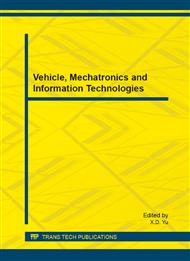p.232
p.237
p.241
p.246
p.253
p.257
p.262
p.266
p.270
A Real-Time Traffic Lights Scheduling Strategy
Abstract:
In this paper, we study the problem of real-time traffic lights scheduling in a three-dimension intersection. Here, we propose a traffic lights scheduling strategy to optimize the traffic lights sequence and duration according to traffic data detected and predicted in real-time, containing traffic volume, delays and traffic density. Simulations are carried out to compare the performance in terms of average delays, and the evaluation depicts that this strategy can obtain lower average waiting delays.
Info:
Periodical:
Pages:
253-256
Citation:
Online since:
August 2013
Authors:
Price:
Сopyright:
© 2013 Trans Tech Publications Ltd. All Rights Reserved
Share:
Citation:


